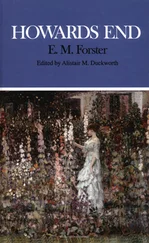He had been talking of his approaching exile in Nigeria, and he should have continued to talk of it, and allowed their guest to recover. But the heave of her bosom flattered him. Passion was possible, and he became passionate. Deep down in him something whispered, "This girl would let you kiss her; you might not have such a chance again."
That was "how it happened," or, rather, how Helen described it to her sister, using words even more unsympathetic than my own. But the poetry of that kiss, the wonder of it, the magic that there was in life for hours after it—who can describe that? It is so easy for an Englishman to sneer at these chance collisions of human beings. To the insular cynic and the insular moralist they offer an equal opportunity. It is so easy to talk of "passing emotion," and how to forget how vivid the emotion was ere it passed. Our impulse to sneer, to forget, is at root a good one. We recognize that emotion is not enough, and that men and women are personalities capable of sustained relations, not mere opportunities for an electrical discharge. Yet we rate the impulse too highly. We do not admit that by collisions of this trivial sort the doors of heaven may be shaken open. To Helen, at all events, her life was to bring nothing more intense than the embrace of this boy who played no part in it. He had drawn her out of the house, where there was danger of surprise and light; he had led her by a path he knew, until they stood under the column of the vast wych-elm. A man in the darkness, he had whispered "I love you" when she was desiring love. In time his slender personality faded, the scene that he had evoked endured. In all the variable years that followed she never saw the like of it again.
"I understand," said Margaret—"at least, I understand as much as ever is understood of these things. Tell me now what happened on the Monday morning."
"It was over at once."
"How, Helen?"
"I was still happy while I dressed, but as I came downstairs I got nervous, and when I went into the dining-room I knew it was no good. There was Evie—I can't explain—managing the tea-urn, and Mr. Wilcox reading the Times ."
"Was Paul there?"
"Yes; and Charles was talking to him about Stocks and Shares, and he looked frightened."
By slight indications the sisters could convey much to each other. Margaret saw horror latent in the scene, and Helen's next remark did not surprise her.
"Somehow, when that kind of man looks frightened it is too awful. It is all right for us to be frightened, or for men of another sort—father, for instance; but for men like that! When I saw all the others so placid, and Paul mad with terror in case I said the wrong thing, I felt for a moment that the whole Wilcox family was a fraud, just a wall of newspapers and motor-cars and golf-clubs, and that if it fell I should find nothing behind it but panic and emptiness. "
"I don't think that. The Wilcoxes struck me as being genuine people, particularly the wife."
"No, I don't really think that. But Paul was so broad-shouldered; all kinds of extraordinary things made it worse, and I knew that it would never do—never. I said to him after breakfast, when the others were practising strokes, 'We rather lost our heads,' and he looked better at once, though frightfully ashamed. He began a speech about having no money to marry on, but it hurt him to make it, and I—stopped him. Then he said, 'I must beg your pardon over this, Miss Schlegel; I can't think what came over me last night.' And I said, 'Nor what over me; never mind.' And then we parted—at least, until I remembered that I had written straight off to tell you the night before, and that frightened him again. I asked him to send a telegram for me, for he knew you would be coming or something; and he tried to get hold of the motor, but Charles and Mr. Wilcox wanted it to go to the station; and Charles offered to send the telegram for me, and then I had to say that the telegram was of no consequence, for Paul said Charles might read it, and though I wrote it out several times, he always said people would suspect something. He took it himself at last, pretending that he must walk down to get cartridges, and, what with one thing and the other, it was not handed in at the Post Office until too late. It was the most terrible morning. Paul disliked me more and more, and Evie talked cricket averages till I nearly screamed. I cannot think how I stood her all the other days. At last Charles and his father started for the station, and then came your telegram warning me that Aunt Juley was coming by that train, and Paul—oh, rather horrible—said that I had muddled it. But Mrs. Wilcox knew."
"Knew what?"
"Everything; though we neither of us told her a word, and had known all along, I think."
"Oh, she must have overheard you."
"I suppose so, but it seemed wonderful. When Charles and Aunt Juley drove up, calling each other names, Mrs. Wilcox stepped in from the garden and made everything less terrible. Ugh! but it has been a disgusting business. To think that—" She sighed.
"To think that because you and a young man meet for a moment, there must be all these telegrams and anger," supplied Margaret.
Helen nodded.
"I've often thought about it, Helen. It's one of the most interesting things in the world. The truth is that there is a great outer life that you and I have never touched—a life in which telegrams and anger count. Personal relations, that we think supreme, are not supreme there. There love means marriage settlements, death, death duties. So far I'm clear. But here my difficulty. This outer life, though obviously horrid, often seems the real one—there's grit in it. It does breed character. Do personal relations lead to sloppiness in the end?"
"Oh, Meg, that's what I felt, only not so clearly, when the Wilcoxes were so competent, and seemed to have their hands on all the ropes. "
"Don't you feel it now?"
"I remember Paul at breakfast," said Helen quietly. "I shall never forget him. He had nothing to fall back upon. I know that personal relations are the real life, for ever and ever.
"Amen!"
So the Wilcox episode fell into the background, leaving behind it memories of sweetness and horror that mingled, and the sisters pursued the life that Helen had commended. They talked to each other and to other people, they filled the tall thin house at Wickham Place with those whom they liked or could befriend. They even attended public meetings. In their own fashion they cared deeply about politics, though not as politicians would have us care; they desired that public life should mirror whatever is good in the life within. Temperance, tolerance, and sexual equality were intelligible cries to them; whereas they did not follow our Forward Policy in Thibet with the keen attention that it merits, and would at times dismiss the whole British Empire with a puzzled, if reverent, sigh. Not out of them are the shows of history erected: the world would be a grey, bloodless place were it entirely composed of Miss Schlegels. But the world being what it is, perhaps they shine out in it like stars.
A word on their origin. They were not "English to the backbone," as their aunt had piously asserted. But, on the other band, they were not "Germans of the dreadful sort." Their father had belonged to a type that was more prominent in Germany fifty years ago than now. He was not the aggressive German, so dear to the English journalist, nor the domestic German, so dear to the English wit. If one classed him at all it would be as the countryman of Hegel and Kant, as the idealist, inclined to be dreamy, whose Imperialism was the Imperialism of the air. Not that his life had been inactive. He had fought like blazes against Denmark, Austria, France. But he had fought without visualizing the results of victory. A hint of the truth broke on him after Sedan, when he saw the dyed moustaches of Napoleon going grey; another when he entered Paris, and saw the smashed windows of the Tuileries. Peace came—it was all very immense, one had turned into an Empire—but he knew that some quality had vanished for which not all Alsace-Lorraine could compensate him. Germany a commercial Power, Germany a naval Power, Germany with colonies here and a Forward Policy there, and legitimate aspirations in the other place, might appeal to others, and be fitly served by them; for his own part, he abstained from the fruits of victory, and naturalized himself in England. The more earnest members of his family never forgave him, and knew that his children, though scarcely English of the dreadful sort, would never be German to the backbone. He had obtained work in one of our provincial Universities, and there married Poor Emily (or Die Engländerin as the case may be), and as she had money, they proceeded to London, and came to know a good many people. But his gaze was always fixed beyond the sea. It was his hope that the clouds of materialism obscuring the Fatherland would part in time, and the mild intellectual light re-emerge. "Do you imply that we Germans are stupid, Uncle Ernst?" exclaimed a haughty and magnificent nephew. Uncle Ernst replied, "To my mind. You use the intellect, but you no longer care about it. That I call stupidity." As the haughty nephew did not follow, he continued, "You only care about the' things that you can use, and therefore arrange them in the following order: Money, supremely useful; intellect, rather useful; imagination, of no use at all. No"—for the other had protested—"your Pan-Germanism is no more imaginative than is our Imperialism over here. It is the vice of a vulgar mind to be thrilled by bigness, to think that a thousand square miles are a thousand times more wonderful than one square mile, and that a million square miles are almost the same as heaven. That is not imagination. No, it kills it. When their poets over here try to celebrate bigness they are dead at once, and naturally. Your poets too are dying, your philosophers, your musicians, to whom Europe has listened for two hundred years. Gone. Gone with the little courts that nurtured them—gone with Esterhaz and Weimar. What? What's that? Your Universities? Oh, yes, you have learned men, who collect more facts than do the learned men of England. They collect facts, and facts, and empires of facts. But which of them will rekindle the light within?"
Читать дальше












